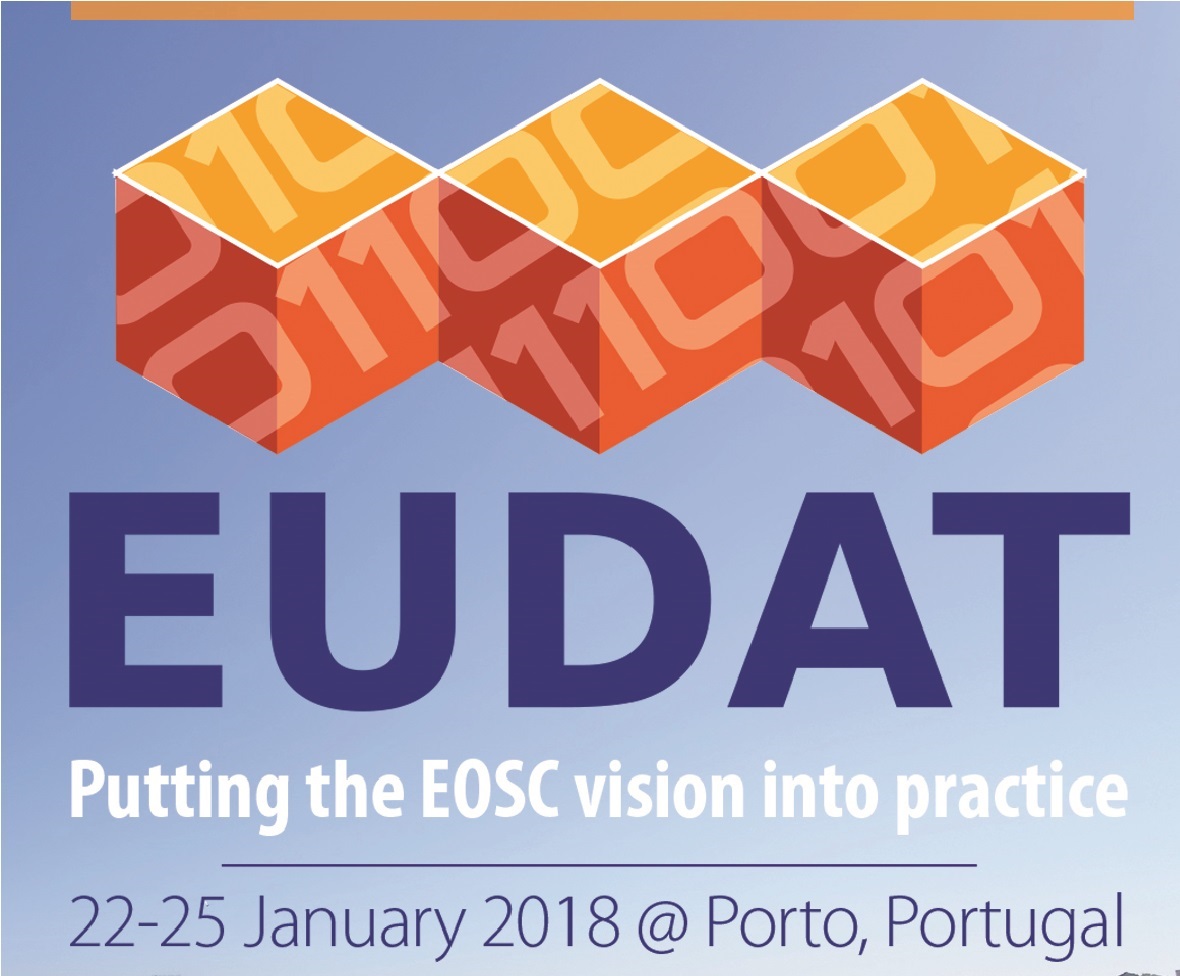
 |
The EUDAT Conference "Putting the EOSC Vision into Practice" will take place on 22 - 25 January 2018 in Porto (Portugal), with the aim of bringing together data infrastructure users and providers and policy makers from across Europe.
A set of co-located workshops, organised by GÉANT, EOSCPilot, AARC, SeaDataCloud, ENVRI, LIBER, the EUDAT Semantics, Sensitive Data and Array Databases Working Groups and many more are complementing the programme.
Here a sneak preview of the workshops:
Check out the full programme of the event and register now! |
|
|
|
Within the EUDAT CDI, a number of semantic services have been developed, either as production-ready services, such as B2NOTE, or as proof-of-concept services for ontology aggregation and discovery, and Data Life Cycle modelling and provenance tracking. The objective of this meeting is to involve research communities in the discussion as to which kind of semantic services are needed to support crucial research challenges. The workshop should result in the definition of new services, as well as supplementary functionalities to be added to existing services for integration in the EOSC vision. The intention is to give an overview of what has been done in this respect within EUDAT and the EUDAT Data Pilots, but also within the research infrastructures collaborating with EUDAT to discover how these services and developments could benefit better from each other. The workshop is open; therefore, members of research communities involved or interested in the development of semantic services, funders and stakeholders involved in EOSC are welcomed to join and contribute to the definition of a potential roadmap for semantic services which could be implemented in the EOSC. |
|
|
| EUDAT will host the third Array Databases WG workshop on 22 Jan 2018 in Porto. This event is co-located with the EUDAT Conference "Putting the EOSC vision into practice". The workshop targets technology experts, research community representatives and practitioners interested in providing their personal experience in adopting such technologies and discovering more about ArrayDB. At the workshop: • Results of the experiments selected in the WG will be presented; • Benefits with respect to traditional methods, limitations, challenges encountered and lessons learned will be discussed; • Possible strategies to be followed up to extend these activities beyond EUDAT2020 and address future work. |
|
|
|
The workshop aims at uncovering intersections between the activities of three organizations supporting research data management practices from different perspectives: RDA, as a standardization body; EUDAT and its Collaborative Data Infrastructure (CDI), providing research data management (RDM) services; and the Research Libraries community, helping researchers be successful in their RDM endeavours. LIBER, EUDAT and RDA will address the work, that needs to be done to harmonise their three roles and perspectives within the lens of the emerging European Open Science Cloud (EOSC) principles, policies and rules of engagement, and interoperable service catalogue. Putting together the EUDAT services and the RDA policies, practices and components, this workshop will help unravel how research libraries can effectively leverage the outcome of EUDAT and RDA within the research communities they support. Practical collaborative approaches will be showcased and emphasized, taking Data Management Plans as exemplar nexuses. Following this approach, synergies can be not only uncovered, but complementary roles of these organizations/communities can be fostered, to promote a pan-European ecosystem of systems in support of effective Open Science.
|
|
|
|
SeaDataNet is a major infrastructure in Europe for managing, indexing and providing access to ocean and marine data sets and data products, acquired from research cruises and other observational activities in European coastal marine waters, regional seas and the global ocean. It also develops and governs common marine standards for metadata and data formats, common vocabularies and quality flags as well as standard software tools. The current EU SeaDataCloud project has a focus on upgrading and expanding the architecture and services of SeaDataNet, inter alia by adopting cloud and High Performance Computing technology. For that purpose SeaDataNet has entered into a strategic and technical cooperation with the EUDAT consortium.
At the Workshop a number of SeaDataCloud activities and their progress will be highlighted.
|
|
|
|
The Horizon2020 cluster project ENVRIplus is one example of a collaboration among domain-specific Research Infrastructures (RIs) that aims to develop reusable solutions that address common challenges in managing research data. This approach is proving very successful, but cannot fully solve interoperability and sustainability questions.
As the European Open Science Cloud (EOSC) is now starting in earnest, it is of great interest to gather relevant experts from the ENVRIplus community, e-Infrastructures and other technology service providers for a discussion of how the services and other products being developed in e.g. ENVRIplus will fit in this new EOSC landscape.
|
|
|
|
EOSCpilot is an EU project that supports the first phase in the development of the European Open Science Cloud (EOSC). Establishing a governance for the EOSC is a challenging task, since it aims at constructing a framework allowing strong but disparate stakeholders to work together. Stakeholders include for instance: research communities, research institutions, research infrastructures, e-infrastructures, and research funding bodies. This framework also needs to address cultural challenges, encouraging the adoption of new ways of working and scientific practices. Overall, it will shape and oversee future development of the European Open Science Cloud. The present session aims at introducing the initial version of the governance framework, to discuss with stakeholders its main characteristics, highlighting possible limitations, incompleteness and problems, collecting suggestions and feedback in order to improve it toward its final implementation. |
|
|
|
The European Open Science Cloud (EOSC) is an initiative from the European Commission to drive Open Science and provide researchers with a trusted virtual environment enabling open and seamless services for data storage, management, analysis, sharing, and re-use, across disciplines. This needs skills, both on the part of researchers and others involved in providing the services. Data stewardship is one of the key skill sets to enable the EOSC.
Stewardship involves professional development across various roles; from data managers, software engineers, to data scientists and researchers generally.Infrastructures, institutions and all kinds of organisation involved in research and its application need to develop stewardship skills to support data science and digital humanities, and to perform and apply research as openly as possible towards the innovation of new products and services. The EOSC will offer an environment to do just that. Its skills development agenda is being shaped by needs and gaps reported by the European Commission’s Open Science Skills Working Group, and articulated in the EOSC Declaration. Since data stewardship is one of the most significant gaps, the EOSCpilot project is recommending options to address a number of issues in this area. These include: the relevant competences for the roles concerned; whether and how FAIR principles can be applied to training, and the scope of training-as-a-service in EOSC.
|
